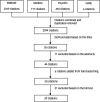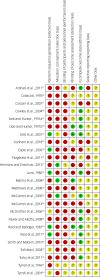Association between epilepsy and psychiatric disorders in adults with intellectual disabilities: systematic review and meta-analysis
- PMID: 33938422
- PMCID: PMC8142548
- DOI: 10.1192/bjo.2021.55
Association between epilepsy and psychiatric disorders in adults with intellectual disabilities: systematic review and meta-analysis
Abstract
Background: Psychiatric disorders, such as depression and anxiety, are commonly associated with epilepsy in the general population, but the relationship between psychiatric disorders and epilepsy among adults with intellectual disabilities is unclear.
Aims: To conduct a systematic review and meta-analysis to assess whether epilepsy is associated with an increased rate of psychiatric disorders in adults with intellectual disabilities.
Method: We included literature published between 1985 and 2020 from four databases, and hand-searched six relevant journals. We assessed risk of bias by using SIGN 50 and the Cochrane risk of bias tool. Several meta-analyses were carried out.
Results: We included 29 papers involving data on 9594 adults with intellectual disabilities, 3180 of whom had epilepsy and 6414 did not. Of the 11 controlled studies that compared the overall rate of psychiatric disorders between the epilepsy and non-epilepsy groups, seven did not show any significant inter-group difference. Meta-analysis was possible on pooled data from seven controlled studies, which did not show any significant inter-group difference in the overall rate of psychiatric disorders. The rates of psychotic disorders, depressive disorders and anxiety disorders were significantly higher in the non-epilepsy control groups compared with the epilepsy group, with effect sizes of 0.29, 0.47 and 0.58, respectively. Epilepsy-related factors did not show any definite association with psychiatric disorders.
Conclusions: It is difficult to pool data from such heterogeneous studies and draw any definitive conclusion because most studies lacked an appropriately matched control group, which will be required for future studies.
Keywords: Intellectual disabilities; epilepsy; meta-analysis; psychiatric disorders; systematic review.
Conflict of interest statement
None.
Figures







References
-
- World Health Organization (WHO). Manual of the International Statistical Classification of Diseases, Injuries, and Causes of Death (11th edn). WHO, 2018. (https://icd.who.int/browse11/l-m/en)
-
- Deb S. Epidemiology and treatment of epilepsy in patients who are mentally retarded. CNS Drugs 2000; 13: 117–28.
-
- Shankar R, Watkins LV, Alexander R, Devapriam J, Dolman J, Hari A, et al. Prescribing Anti-Epileptic Drugs for People with Epilepsy and Intellectual Disability (CR206 Oct 2017). Royal College of Psychiatrists, 2017. (https://www.rcpsych.ac.uk/improving-care/campaigning-for-better-mental-h...).
-
- Deb S. Epilepsy in people with mental retardation. In Handbook of Mental Retardation and Developmental Disabilities (eds Jacobson JW, Mulick JA, Rojahn J): 81–96. Kluwer Academic Publishers, 2007.
-
- Shankar R, Eyeoyibo M, Scheepers M, Dolman J, Watkins LV, Attavar R, et al. Management of Epilepsy in Adults with Intellectual Disability (CR203 May 2017). Royal College of Psychiatrists, 2017. (https://www.rcpsych.ac.uk/improving-care/campaigning-for-better-mental-h...).
LinkOut - more resources
Full Text Sources
Other Literature Sources

